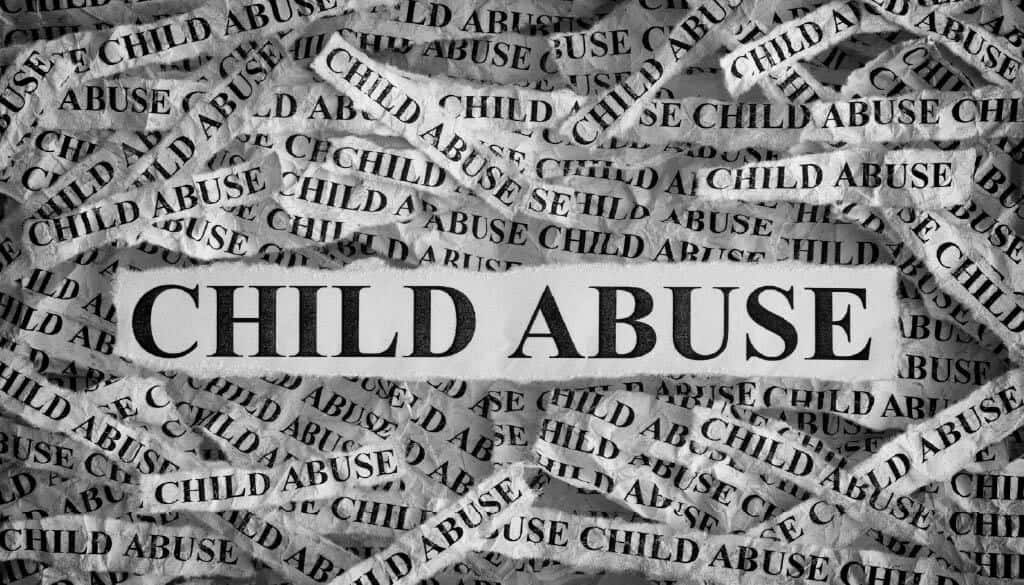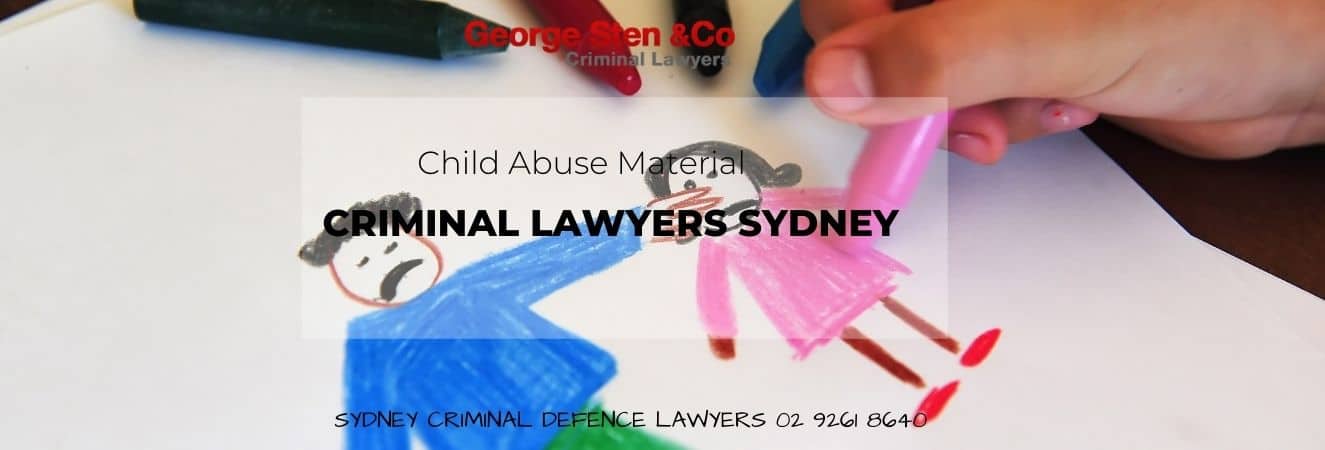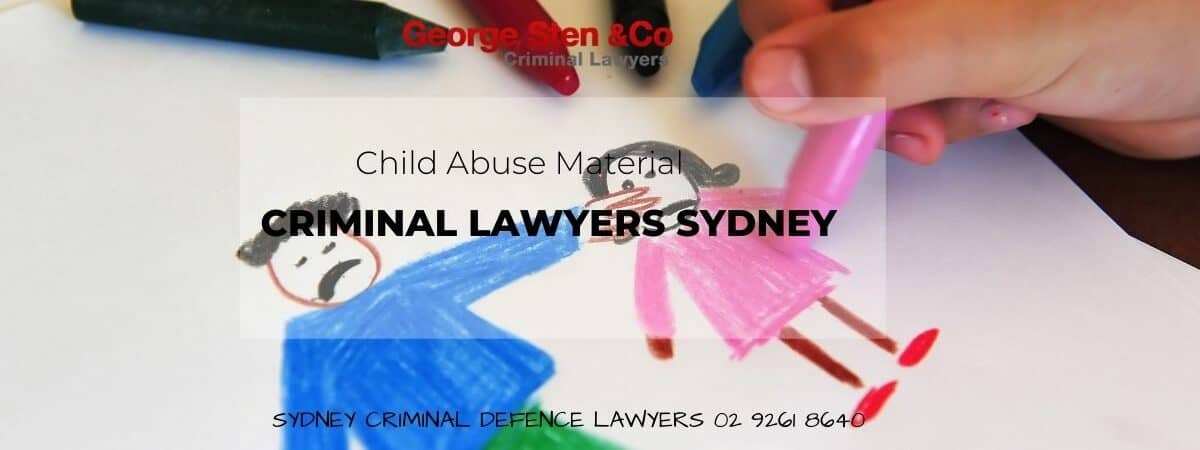Child abuse material, offences relating to child abuse material are serious, and people found guilty of such a charge may be prevented from accessing certain career paths. In order to understand the nature of the offence, it is necessary to break down the various elements, which will be discussed below.
According to s91H of the Crimes Act 1900 (NSW), production, dissemination or possession of child abuse material renders the offender susceptible to a maximum 10 year imprisonment period. The maximum penalty for child abuse materials was increased from a five year imprisonment period to 10 years’ imprisonment to reflect the serious criminality involved in this type of offence (R v Porte [2015] NSWCCA 174).

Child abuse material is defined in s91FB(1) as material that depicts or describes a person who is or appears to be a child as ‘a victim of torture, cruelty or physical abuse’, is ‘engaged in a sexual pose or sexual activity’, or their private parts are displayed in a manner which a reasonable person would find offensive. Also relevant is whether there are other people present, which can be an aggravating factor taken into account by law enforcement officers. ‘Private parts’ for the purpose of this section refer to the genital or anal area (s91FB(4)(a)), and the female breasts (s91FB(4)(b)).
Factors to be taken into account in determining the offensive nature of the material, pursuant to s91FB(2), include ‘the standards of morality, decency and propriety generally accepted by reasonable adults’, ‘the literary, artistic or educational merit (if any) of the material’, ‘the journalistic merit (if any) of the material, being the merit of the material as a record of public interest’, and ‘the general character of the material (including whether it is of a medical, legal or scientific character)’.
Pursuant to s91H(1), ‘disseminate’ in this context includes: to ‘send, supply, exhibit, transit or communicate it to another person’, to ‘make it available for access by another person’, or to ‘enter into any agreement or arrangement to do so’. ‘Possess’ refers to ‘being in possession or control of data’ in the meaning of s308F, which concerns the intention to commit or facilitate a serious computer offence (s308F(1)). ‘Produce’ means to ‘film, photograph, print or otherwise make child abuse material’, to ‘alter or manipulate any image for the purpose of making child abuse material’, or to ‘enter into any agreement or arrangement to do so’.
As this is a serious offence, the matter may be heard in either the Local Court or in the District or Supreme Courts. If it is heard in the Local Court, the maximum term of imprisonment is 2 years, but if it is heard in a higher court, the offender may incur the maximum sentence. It is important to remember, however, that the length of the sentence is dependent on the circumstances of the case, and will vary for each scenario. The DPP or the accused can elect to have the matter dealt with in the District Court, and if no election is made then it will be heard in the Local Court.
The types of penalties that may be imposed range from Section 10 orders to imprisonment. These will be discussed below.
A Section 10 defence concerns the actual recording of a conviction. A conviction is recorded when you plead guilty to an offence, and from this point on you have a criminal record. In criminal matters, there is the discretion of the court to issue a Section 10 dismissal. If your defence lawyers can convince the judge not to convict you, no penalty or criminal record is incurred under a Section 10 dismissal.
An alternative penalty is a good behaviour bond or suspended sentence for a charge of breach to s91H. This involves the offender having to display good behaviour for a certain period of time, or undertake community service work. Both of these penalties require the discretion of the sentencing officer, and the offender is subject to certain conditions surrounding this type of sentence. The good behaviour bond operates by manner of a suspended sentence, meaning that if the good behaviour agreement is breached, the imprisonment term can come into effect.
The purpose of regulating this type of behaviour extends from concern for the children who are the subject of the content. Reasoning that consumer demands influence the amount of content produced, law enforcement seeks to cut off the audience and prevent large volumes of content being produced. Looking at s91G of the Crimes Act, the maximum penalty for using or assisting in the procurement of a child under the age of 14 years for the purpose of producing child abuse material is 14 years’ imprisonment (s91G(1)), or 10 years’ imprisonment in an instance where the child is over 14 years (s91G(2)).
Innocent production, dissemination or possession is a defence in the circumstance where the ‘the defendant did not know, and could not reasonably be expected to have known, that he or she produced, disseminated or possessed child abuse material’ (s91HA(1)). Similarly, it is a defence for a s91H offence (not involving the production or dissemination of child abuse material) that ‘the concerned came into the defendant’s possession unsolicited and the defendant, as soon as he or she became aware of its nature, took reasonable steps to get rid of it’, pursuant to s91HA(2).
Another defence relies on the ‘public benefit’ of the conduct engaged by the defendant (s91HA(3)). Conduct is only of public benefit if it is necessary for assistance in enforcing the law or the administration of justice (s91HA(4)). This is a question of fact, meaning the person’s motives for engaging in the conduct are irrelevant, pursuant to s91HA(5). Classified material (s91HA(7)) and approved research (s91HA(8)) are other categories of defence to a charge under s91H.
If you have reason to believe that you may be charged with an offence related to child abuse material, or you have already been charged, contact one of our Criminal Lawyers. Based in Sydney, our legal team will protect your reputation and work to clear your name. We can provide expert advice to ensure that the matter is dealt with quickly and thoroughly.


